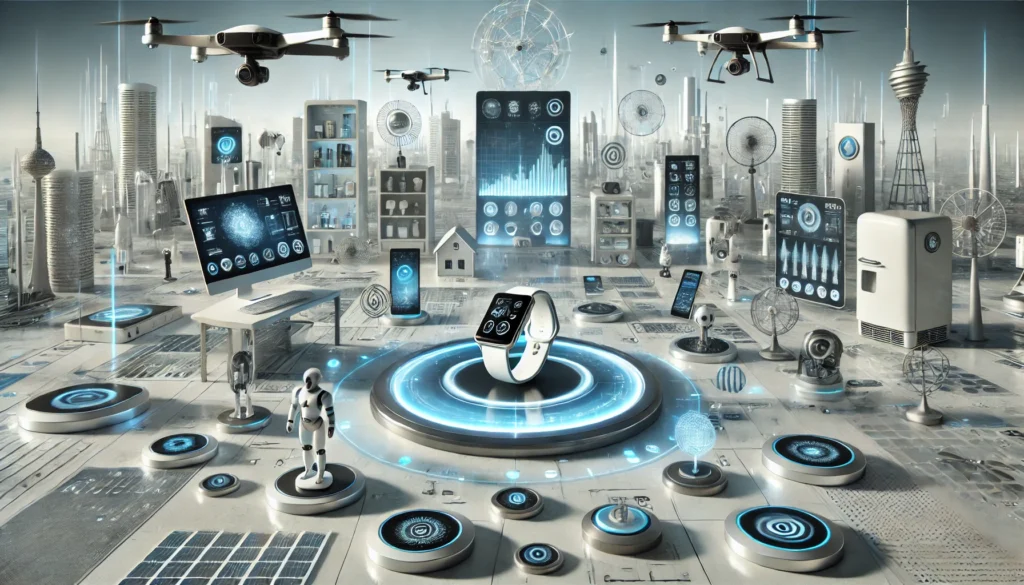Smart devices are rapidly evolving and becoming an integral part of our daily lives. From smart homes to wearable technology, these innovations are shaping the way we live, work, and interact with the world. This article explores the future of smart devices, highlighting emerging trends, technologies, and their impact on society.
The Evolution of Smart Devices
Smart devices have come a long way from basic automation. Early innovations focused on convenience, such as smart thermostats and voice assistants. Today, advanced artificial intelligence (AI) and the Internet of Things (IoT) are driving the next generation of smart technology.
- Increased Connectivity
Devices are becoming more interconnected, allowing seamless communication between smart home systems, wearable devices, and even smart vehicles. - AI Integration
Artificial intelligence is enhancing smart devices by enabling personalized experiences, real-time decision-making, and predictive analysis. - Edge Computing
Edge computing reduces latency by processing data closer to the source, improving the speed and reliability of smart devices.
Emerging Trends in Smart Devices
- Smart Homes 2.0
Future smart homes will feature advanced automation, energy efficiency, and improved security systems powered by AI. - Wearable Health Tech
Smartwatches and fitness trackers are evolving to monitor vital signs, detect early health issues, and provide real-time health data. - Smart Cities
Urban environments are integrating smart technologies to improve traffic management, energy consumption, and public safety. - Voice and Gesture Control
Future smart devices will respond not only to voice commands but also to gestures and facial recognition for enhanced usability. - Sustainable Technology
The next wave of smart devices will prioritize eco-friendly materials, energy conservation, and sustainability.
Impact of Smart Devices on Daily Life
- Enhanced Convenience
Smart devices streamline everyday tasks, from controlling home appliances to managing schedules and shopping lists. - Improved Healthcare
Wearable smart devices provide continuous health monitoring, allowing early detection of medical conditions and remote patient care. - Smart Workspaces
Intelligent office devices optimize productivity through automated scheduling, smart lighting, and remote collaboration tools. - Increased Security
Smart security systems offer real-time monitoring, remote access, and advanced threat detection for homes and businesses. - Personalized Experiences
AI-driven smart devices learn user preferences to deliver customized entertainment, shopping suggestions, and more.
Challenges and Considerations
- Privacy Concerns
As smart devices collect and share data, ensuring user privacy and data security is a critical concern. - Device Compatibility
Ensuring seamless integration across multiple brands and platforms remains a challenge for consumers and manufacturers. - Cost Accessibility
Advanced smart devices can be expensive, limiting their accessibility for some users. - Energy Consumption
While smart devices aim to improve efficiency, they must also address the increased energy use associated with constant connectivity.
Future Innovations in Smart Devices
- 5G and Beyond
The rollout of 5G will enable faster, more reliable connections, enhancing the performance of smart devices. - Augmented Reality (AR) Integration
Smart devices will incorporate AR for immersive experiences in gaming, shopping, and education. - AI-Powered Assistants
Future smart assistants will become more intuitive, offering predictive suggestions and deeper contextual understanding. - Biometric Security
Advanced biometric authentication methods, including voice and facial recognition, will enhance device security.
FAQs:
1 What are smart devices?
Smart devices are internet-connected gadgets that use advanced technologies like AI and IoT to automate tasks and provide personalized experiences.
2 How will smart devices evolve in the future?
Future smart devices will feature improved AI integration, faster 5G connectivity, enhanced security, and increased focus on sustainability.
3 What are the benefits of smart devices?
Smart devices offer convenience, improved healthcare monitoring, enhanced security, and personalized user experiences.
4 What challenges do smart devices face?
Key challenges include data privacy concerns, device compatibility issues, high costs, and increased energy consumption.
5 What innovations can we expect from future smart devices?
Innovations include AI-powered assistants, biometric security, augmented reality integration, and smarter city infrastructure.
Conclusion:
The future of smart devices promises a more connected, efficient, and personalized world. As technology advances, smart devices will continue to revolutionize how we interact with our surroundings, from homes and workplaces to cities and healthcare systems.
Embracing these innovations while addressing privacy, compatibility, and sustainability concerns will be key to shaping a smarter and more secure future. Whether you’re a tech enthusiast or a casual user, the next generation of smart devices is set to redefine modern living.



